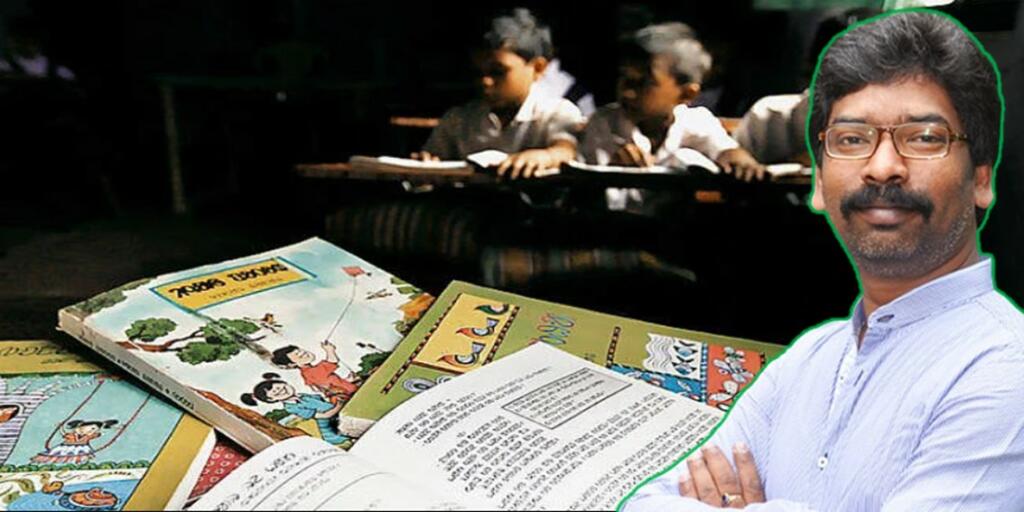Jharkhand Mukti Morcha (JMM) – the Jharkhand based party primarily banks on tribal votes. The party’s existence is highly based upon tribals and interestingly, the state has now more urban elites than tribals. Moreover, under the garb of tribal welfare, the Jharkhand government has only been increasing its political strength.
In one such move, the JMM-led mahagathbandhan ruling alliance has decided to include chapters on party patriarch Shibu Soren in the school curriculum.
Jharkhand gov bragging about Soren
It was two days back when state education minister and JMM leader Jagarnath Mahto during a visit to Bokaro announced that Shibu and other Jharkhand movement leaders – Vinod Bihar Mahto and Sunil Mahto will be included in the school syllabus.
Notably, the declaration came after JMM’s call to paint all government-run schools green, the colour of the tribal party’s flag and election symbol.
It is pertinent to note that the schools were painted pink after Jharkhand was declared a state.
While Congress, one of its ally partners, has welcomed the move, BJP has accused the Hemant Soren-led government of politicising the state’s education system.
Mahto, however, justifying the decision, said, “Since the formation of Jharkhand in 2000, no government has ever worked towards educating our students about the statehood movement and the people who had dedicated their lives for the cause. Figures like Disom guru Shibu Soren, Binod babu and Nirmal Mahto have an unparalleled stature and we must teach our future generation about their struggle. From next year, we will include their chapters in the school curriculum and the groundwork for which will begin soon.”
Soren used tribals for his selfish political ambitions
Shibu Soren was born in Nemra village of Ramgarh district. At the age of 18, he formed the Santhal Navyuvak Sangh. In 1972, Bengali Marxist trade union leader A K Roy, Binod Bihari Mahato and Shibu Soren formed the Jharkhand Mukti Morcha.
At the age of 18, he formed the Santhal Navyuvak Sangh. In 1972, Bengali Marxist trade union leader A. K. Roy, Kurmi-Mahato leader Binod Bihari Mahato and Santal leader Shibu Soren formed Jharkhand Mukti Morcha. JMM protested to reclaim the tribal lands which were allegedly isolated. On 23 January 1975, he allegedly incited a campaign to oust “outsiders”, or the ‘non-tribal’ people in which around eleven people were killed.
Following his ideology, the junior Soren Chief Minister Hemant Soren has also adopted the divide and rule policy. They have been playing trying to divide tribals from Hindus only to encash a few votes.
Jharkhand Chief Minister Hemant Soren had once said that “Adivasis were never Hindus and they never will be” and that there should be no confusion about this.
While responding to a question on whether tribals were Hindus after delivering a virtual lecture at the 18th Annual India Conference at Harvard University, he said, “The community has always been of nature worshipers, and that this is the reason why they are counted as “indigenous people.”
“There are 32 tribal communities in our state, but in Jharkhand we have not been able to promote our language, culture…,” he added
Not only that, but the party has also been advocating for a new religious identity. He had once accused the political parties of treating the tribals as napkins. He said, “They are used as napkins. If the tribals are educated, who will be there to serve as drivers and cooks of the corporate?
Jharkhand was carved out from Bihar in 2000. Previously, it was a part of the southern half of Bihar. It is the homeland of the tribal people who had dreamt of a separate state for a long time.
It is pertinent to note that Jharkhand was carved out of Bihar in 2000. The reason was the tribal population. While the political leaders like Soren kept claiming that it is for the benefit of tribals, it was the CM chair that they were actually interested in. The leaders misused the issue of the tribals for their own political benefits and still continue to do so.
